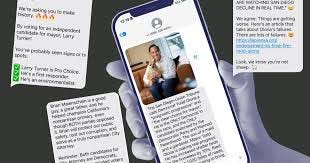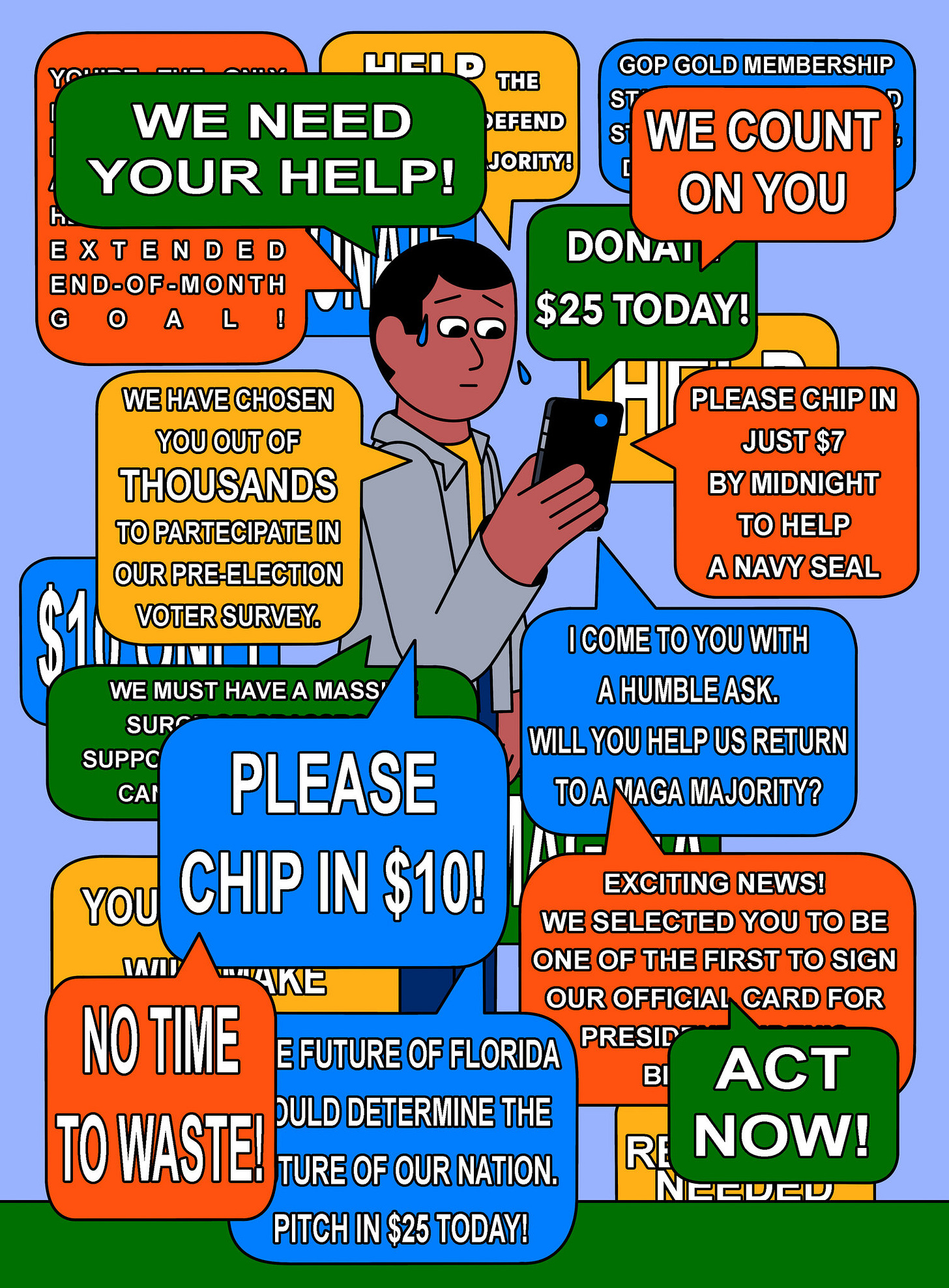By Bruce Watson
Stop me if you’ve read this one. Hi, [YOUR NAME HERE], it’s Chuck Schumer. Do you have minute to. . .”
Political texting, once overshadowed by e-mail, phone banking, and other campaign outreach, now haunts every smart phone in America.
“Hi YOUR NAME, James Carville here. Is there anything I can say to convince you to donate five bucks to. . .”
During the 2024 campaign, when estimates put the number of political texts well above 20 billion, many of us counted down the days until the election. Along with believing Kamala Harris would win, we believed the daily assault of texts would finally. . . STOP. We were wrong on both counts.
Texting continues, said Lloyd Cotler, principle of Banter Communication, because it still works. A smaller percentage of targets donates these days, Cotler told the Connector, yet due to sheer volume “texting brings in significantly more money now than ever before.”
Along with revenue, other reasons explain why political texting is here to stay.
— Compared with other forms of fundraising, texting is cheap. Most firms charge just a few cents per text.
— Texts can be targeted in ways that email and phone calls cannot be.
— Texts are immediately seen, as opposed to email and snail mail that pile up in queues or waste baskets. “Texting breaks through the noise in a way that e-mail does not,” said Cotler, who ran texting for “Hillary for America” in 2016.
But as texting amps up, Dems face several questions.
— Is unwanted texting the best face to put on the party?
— Could relentless texting create a backlash against the party?
— Is there a way to send smarter texts?
Cotler thinks Democrats should “change their strategy entirely.” First, “bring texting in house. Don't let digital firms do it.” And the messages themselves? “Send more messages that ask for people's input and thoughts, and actually read and respond to them.”
With new leadership in the Democratic National Committee, some are hopeful. Candidate Jason Paul was not chosen to head the DNC, but his message was clear. Stop the “insane, over-saturation of fundraising solicitations.” In a Grassroots Connector article last month, Paul outlined a texting strategy.
— Send fewer texts.
— Send smarter texts, Paul wrote, texts that “include specific ideas with price tags for those specific initiatives, what the impact will be, and the rationale for the proposed action.”
— Send calmer texts: “We should stop focusing primarily on the main nemeses, and the need to oppose them, and instead explain what specifically the money will be used for. We now are functioning like a bad charity that keeps making the equivalent of the pitch, ‘kids are dying,’ without saying how we’re going to save them.”
Fewer, smarter, calmer. A good start, but as texting grows from a nuisance to a scourge, how can you take cover? Here’s the bad news.
Political texts may be offensive, but unlike phishing and other scams, there’s nothing illegal about them. They are exempt from the Federal Trade Commission’s “Do Not Call List.” Your phone number, found on your voter registration, is public property. And the FCC pays mere lip service to protecting you.
“Political text messages sent to a mobile phone using an autodialer require the called party's prior express consent,” the FCC writes. “If you think you've received a political robocall or text that does not comply with the FCC's rules, you can file an informal complaint with the FCC at fcc.gov/complaints.”
Right.
Verizon, ATT, and other carriers require bulk texters to register and provide a list of recipients who have agreed to receive unsolicited texts. But “the regulation process is a joke,” Cotler said. “Everybody’s figured out how to scam the process. None of the carriers asks whether these people actually agreed to anything. The only enforcement they have is filtering your messages, and that’s easy to dodge. It’s a game of wack-a-mole.”
Democrats, Cotler said, don’t have to play that game. To avoid enraging voters, Dems should “only text people who've opted in.” But isn’t texting like any other hunter-gatherer activity? You have to cast a wide wide net?
Cotler no longer thinks so. “Stop measuring success in terms of only dollars raised vs. cost of message sent,” he advised. “Include long-term metrics looking at subscriber behavior.” In other words, get smarter.
“Grassroots donors have tuned out because they’re now getting texts from 800 places they didn’t subscribe to,” Cotler said. “But there’s still that steady drip of repeat donors, partly because of the deceptive tactics some firms use.”
In the meantime, as your phone racks up ten, fifteen, twenty pleading texts per day, what can you do? Why not try what everyone is doing these days? Turn to the free market.
With texting morphing into a scourge, several apps now promise to do what the FCC and STOP2END won’t — block all unwanted texts. Among the best-reviewed apps are: SpamStrike, SpamSMS, Truecaller, Hiya, SpamHound, TextKiller, and RoboKiller. Some are free, others charge the usual one-time fee. But do they work?
Last Wednesday at about noon, I downloaded SpamStrike. A week later, I have not received a single political text. SpamStrike, my Message Filters tells me, has blocked 22 texts. Free at last.
But even if my phone is redeemed, texting will only accelerate in the coming years, Lloyd Cotler predicts.
“People savvy enough to download apps to protect them weren’t going to give much anyway. Unfortunately there’s always going to be a pool of people falling for the scams and other pitches. Politicians are not in the habit of taking money out of their own coffers, so the only actor in the process that has the incentive to do anything is the carriers and I don’t see them in a big rush to pick a fight with an administration that has shown they will use the state against them.”
“Hey, YOUR NAME, it’s Nancy Pelosi. Do you have a minute. . .”






It's long been suggested that the Dems use the talents of Hollywood directors...Spielberg, etc...to orchestrate entertaining, very short, messages. Like no more than 15 seconds. Message only. Do not solicit for money. No talking heads. Dems need to start doing things no one else is doing. So far, they are just falling in line behind everyone else's ideas. Start thinking outside the box. Go out on a limb. They need to get positive attention, not be another annoyance.
I have a policy never to donate via text request. I simply write stop and move on. I do volunteer to text via organizations I trust that send out GOTV messages with useful information about early voting, vote by mail deadlines, polling locations etc. we are human volunteers and we reply to questions and comments with further information. I occasionally text with specific campaigns but NEVER to fundraise only to help get out the vote. Some people are super appreciative and others are understandably annoyed. I’m interested in your thoughts